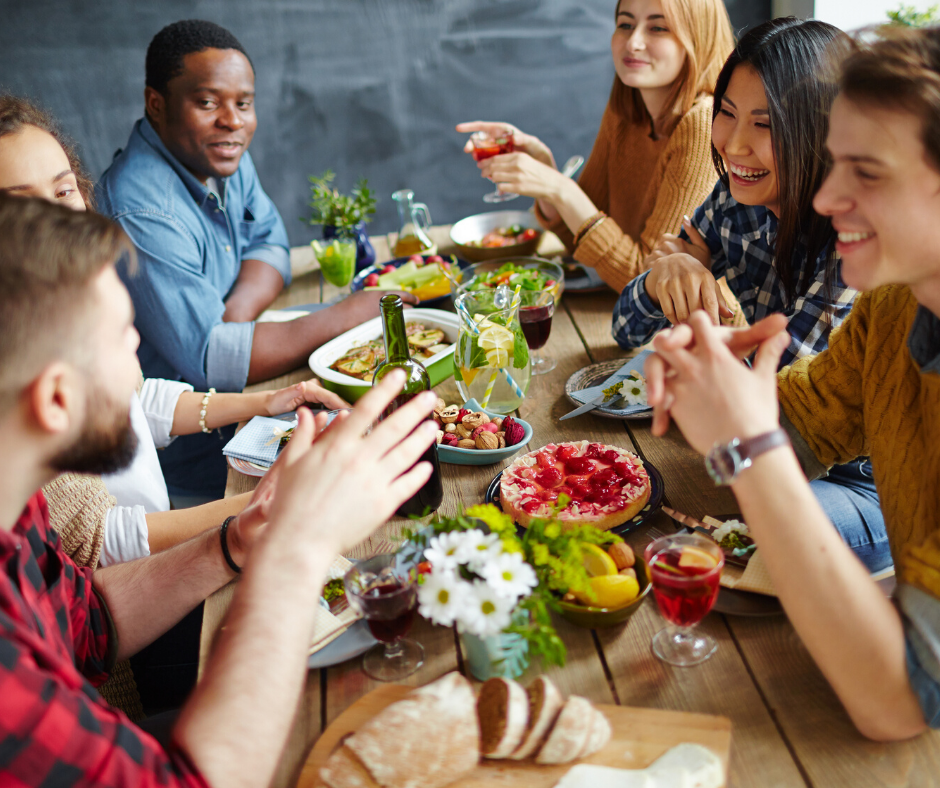How you eat is more important than what you eat

In the 1980s, researchers made a peculiar observation about French cuisine and the health of the French population. The French regularly consumed high quantities of saturated fats in the form of cheese and butter, which were known to be associated with heart disease. However, the French people experienced lower rates of heart disease compared to people of other cultures who had adopted more objectively "heart healthy" diets. So were we wrong to demonize saturated fats here or was there something else going on?
It turns out that one of the main contributing factors to this so-called "French paradox" is the French lifestyle. Notably, the practice of eating slowly in the company of friends and family and taking time to savor food is deeply ingrained in French culture. The French view dinnertime as a social and leisurely event that can last up to 2 hours. Families gather around the table, engage in conversation, and fully appreciate their food.

This tradition is a stark contrast to many American households in the current day and age, in which dinners are scarfed down in a matter of minutes and often in front of a blaring television. It just comes to show the extent to which mindful eating behaviors contribute to overall health and well-being.
Research shows that our specific food choices are probably less important than simply paying attention to our food and how it makes us feel. This can be difficult to achieve when we are rushed, busy, and stressed, because we more easily ignore our body’s natural cues. However, by fully committing to slowing down and eating mindfully, we can not only improve our health, but also maximize our enjoyment of food. Here's how.
Eating slowly prevents overeating
Our bodies need time to signal to the brain that we are full. This fullness signal is typically sent around 20 minutes after the start of a meal. So when we eat too quickly, we may inadvertently eat too much before we realize it.
This can be particularly troublesome when we mindlessly snack outside of regular mealtimes. In this case, we're not following a standard routine of sitting at a table in the company of others. Rather, we are eating in an unstructured setting, in which we are less likely to pay attention to our body's true hunger or fullness. Instead, we're likely to be eating purely out of boredom or habit. Clearly, this leads to eating more than we need to, which contributes to weight gain over time.

Eating slowly improves digestion
Do you ever feel bloated and uncomfortable after a meal and wonder which food your body is reacting poorly to? Well, more often than not, that discomfort does not result from any particular food, but rather from your lack of chewing.
Chewing our food is an important first step in breaking it down. The action of chewing and tasting food also signals to the stomach and intestines that they need to get ready to work. While most foods should be chewed about 30 times before swallowing, we often eat in a rush and chew much less than the recommended amount.
As a result, our digestive tracts are bombarded with large clumps of food before they are ready to receive them. So it's no surprise that we're left to deal with indigestion, bloating, and stomach pains in the aftermath of eating.
Eating slowly helps us feel satisfied
When we take our time to savor our meals, it gives us a chance to fully taste appreciate our food. With each bite, we can engage our senses to enjoy the textures and flavors of food. This makes the experience of eating more satisfying, as we are able to fully immerse ourselves in it.
Eating slowly can also enhance the social aspect of eating. Instead of simply downing everything on our plates as quickly as possible, we can take breaks to converse with others at the table and connect with them. When we engage with friends and family, we elevate our meal by sharing the experience and deepening our social relationships at the same time.

A mindful eating exercise
If you're looking to develop a more mindful approach to eating, you can give this exercise a shot. While there isn't necessarily a "right" way to eat slowly and mindfully, starting with these steps can make it more approachable.
- Sit at a table, with no other distractions. No smartphone, no TV, no tablet, no work.
- Look at what you’re about to eat.
- Take a bite of food. Chew slowly. Notice the scent, taste, texture, and temperature.
- Put your utensils down. Pause.
- Take a few breaths. Relax your body.
- Check in with yourself. What do you sense physically? What do you feel emotionally? What are you thinking about?
Repeat 3-6 as many times as you feel like doing so.


